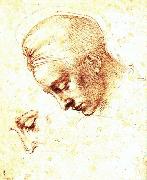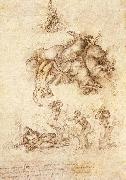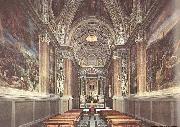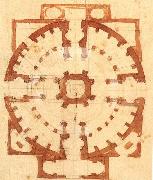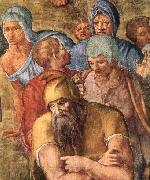
|
Artists
Index
|
||
|
Michelangelo Buonarroti
|
||
|
Study of a Head new21/Michelangelo Buonarroti-325289.jpg ID de tableau:: 62907 |
1530 Red chalk, 33,5 x 26,9 cm Casa Buonarroti, Florence Michelangelo seems to have conceived only one erotic painting involving a woman, the Leda and the Swan. The painting is lost, only this very fine read chalk study of a head has survived. Artist: MICHELANGELO Buonarroti Title: Study of a Head Date: 1501-1550 Italian , graphics : study | |
| |
|
|
|
|
||
|
The Fall of Phaeton new21/Michelangelo Buonarroti-745638.jpg ID de tableau:: 62908 |
1533 Chalk British Museum, London In Greek mythology Phaeton was the son of Helios, the sun-god. Helios drove his golden chariot, a 'quadriga' yoked to a team of four horses abreast, daily across the sky. Phaeton persuaded his unwilling father to allow him for one day to drive his chariot across the skies. Because he had no skill he was soon in trouble, and the climax came when he met the fearful Scorpion of the zodiac. He dropped the reins, the horses bolted and caused the earth itself to catch fire. In the nick of time Jupiter, father of the goods, put a stop to his escapade with a thunderbolt which wrecked the chariot and sent Phaeton hurtling down in flames into the River Eridanus (according to some, the Po). He was buried by nymphs. Phaetons's reckless attempt to drive his father's chariot made him the symbol of all who aspire to that which lies beyond their capabilities. The fall of Phaeton was a popular theme, common in Renaissance and Baroque painting, especially on ceilings in the later period. Phaeton, the chariot, and four horses, reins flying, all tumble headlong out of the sky. Above, Jupiter throws a thunderbolt. Artist: MICHELANGELO Buonarroti Title: The Fall of Phaeton Date: 1501-1550 Italian , graphics : religious | |
| |
|
|
|
|
||
|
View of the Chapel new21/Michelangelo Buonarroti-967973.jpg ID de tableau:: 62909 |
Palazzi Pontifici, Vatican Between 1537 and 1540, Antonio da Sangallo the Younger built the Pauline Chapel in the Vatican, as Pope's (Paul III) private chapel. In 1541 Michelangelo was asked to decorate the central parts of the two longer walls with two frescoes. The first, The Conversion of Saint Paul, was begun in 1542; the second, the Martyrdom of St Peter, was painted between 1546 and 1550. Before this, no one had ever attempted to place these two themes next to each other. Michelangelo portrays what is by this time his plan of life: death for the faith must follow conversion and be its confirmation. To Paul, who has fallen and has been forced to shut his eyes because of the brilliance of divine light, he gives his own face and makes Peter, nailed to the cross, in the supreme tension of the last moment of life, forcefully look at the spectator. Artist: MICHELANGELO Buonarroti Title: View of the Chapel Date: 1501-1550 Italian , painting : other | |
| |
|
|
|
|
||
|
Plan for a Church new21/Michelangelo Buonarroti-385484.jpg ID de tableau:: 62910 |
. 1560 Ink Casa Buonarroti, Florence During the last ten years of his life Michelangelo mainly drew plans for new buildings and perhaps for further sculpture. After his reconciliation with Cosimo de' Medici, he designed new plans for San Giovanni dei Fiorentini in Florence. Artist: MICHELANGELO Buonarroti Title: Plan for a Church Date: 1501-1550 Italian , graphics : study | |
| |
|
|
|
|
||
|
Martyrdom of St Peter new21/Michelangelo Buonarroti-692685.jpg ID de tableau:: 62911 |
1546-50 Fresco, width of detail 108 cm Cappella Paolina, Palazzi Pontifici, Vatican The detail shows figures from the right side of the fresco. Artist: MICHELANGELO Buonarroti Title: Martyrdom of St Peter (detail) Date: 1501-1550 Italian , painting : religious | |
| |
|
|
|
|
||
| Artiste prochain | ||
|
Also Buy::. For Following Paintings / Artists / Products, Please Use Our Search Online: |





